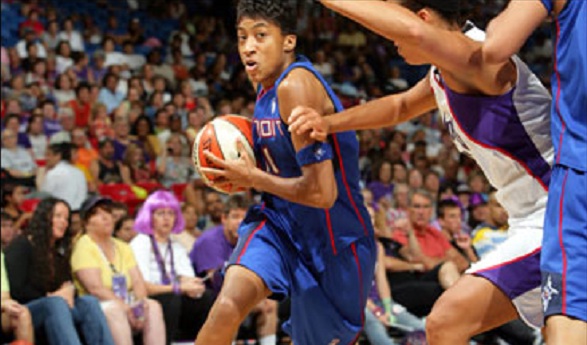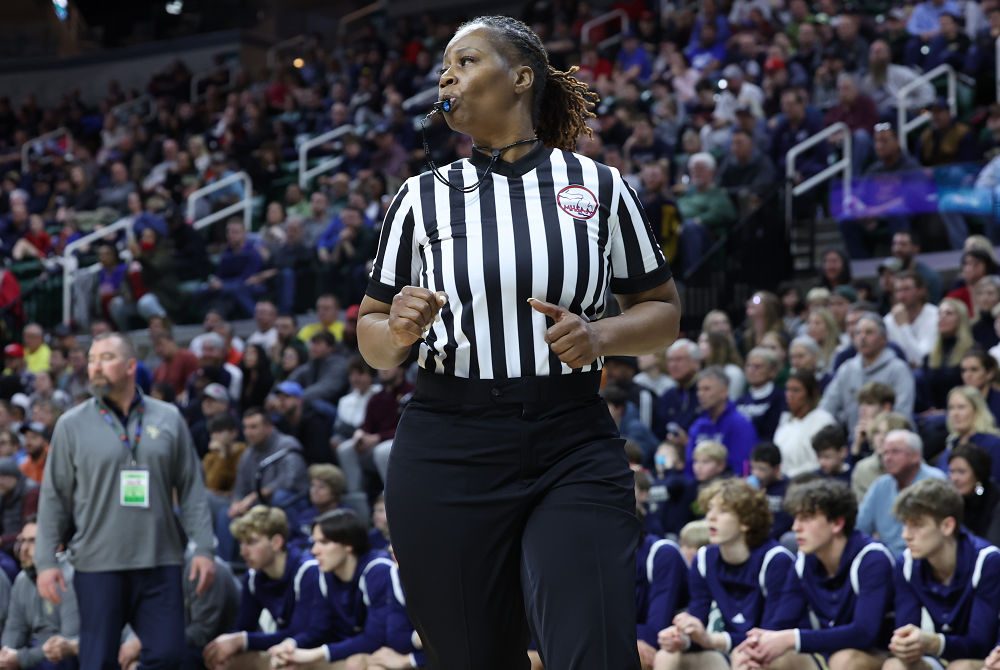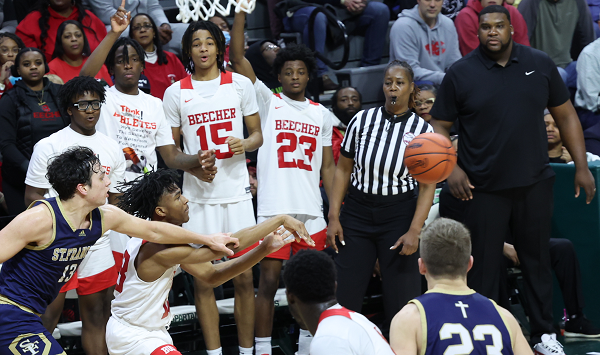
Right Where She’s Always Been
January 3, 2013
By Rob Kaminski
MHSAA benchmarks editor
It was between seasons for WNBA player Stacey Thomas. She sat in her Northwestern University basketball office, where she worked as the Wildcats' director of basketball operations, and listened to a message that she’d heard somewhere before.
“It was before a game in 2004, when an official for that night’s game – Marvin Sykes – stopped into my office and was chatting up officiating,” Thomas recalls. “He gave me recommendations for different associations, and various contacts, and that's when I actually registered and started reading rules books and studying mechanics.”
Suffice to say, basketball was her life. From her days as a prep standout at Flint Southwestern to a brilliant career at the University of Michigan, and ultimately to the sport’s pinnacle with a six-year career in the WNBA, Stacey Thomas had achieved hoops success beyond her wildest dreams.
Yet, it was two instances off the court – mere blips among the thousands of chance meetings and casual introductions in one’s lifetime – which steered Thomas where she is today. Ironically, it’s still on the basketball court.
The conversation with Sykes was the second moment, and it struck a familiar chord with a message she had heard years earlier as a collegiate player in Ann Arbor.
“The first time I ever thought about officiating was when I was playing at the University of Michigan. A little bug was put in my ear during the preseason when officials come in to talk about officiating, the rules changes, how the game is going to be called; that sort of thing,” Thomas recalls. “It was Patty Broderick (professional and collegiate official who currently serves as Coordinator for the Women's Basketball Officiating Consortium). And at end of that talk she told us how officiating could be a great career and a way to stay in the game.”
In the short term, however, Thomas had other ways to stay in the game. You could even say, she stole her way into extending her playing career. As a Wolverine, Thomas set a Big Ten Conference record with 372 career steals, 157 more than any player in U of M history. Her 1,556 points rank fifth in the Wolverine books.
Those numbers and her work ethic led to six seasons in the WNBA, highlighted by a championship with the 2003 Detroit Shock. Thomas played 175 games over six seasons with four teams. And, when her days in “The League” were done, Thomas’ skills took her overseas to stints in Sweden, Turkey and Latvia over three years.
All the while, however, Thomas had her sights set further down the road, for when the game stopped. As it turns out, it hasn’t stopped at all.
“As the years went by and I decided I was done playing, I thought about what I really wanted to do. I knew I wanted to stay in basketball,” Thomas said. “I was an assistant coach at Central Connecticut State in 2004; it was a good experience, but I liked the administrative job at Northwestern better.”
And, of course, there was always that officiating thing she’d heard about.
“While I was looking, I thought maybe I needed to really explore the officiating option,” Thomas said, and she now enters her sixth year as an MHSAA registered basketball official. “As involved as I was with basketball, it gave me the opportunity to stay in the game and be surrounded by the game. It’s a source of pride, and for me it’s the ongoing concept of getting it right and always striving to be better. I want to be professional, set goals and be the best official I can be.”
In other words, she approached officiating in the same manner she attacked opponents on the basketball floor. It’s still the game she’s known her whole life, just from a different perspective.
“As a player, I was around a lot of different coaches and a lot of different teammates, and they all have their own personalities. Understanding that really helped in the transition to officiating,” Thomas said. “You learn to pick your battles and to take things in stride. You can't take things personally. Some coaches try to rattle you by being vocal and boisterous, and others are sarcastic and joking. As a player or as an official you have to read personalities. Playing the game helped me learn how to react, speak to them, and communicate.”
At times, her fame comes into play as well. It’s not easy to hide when officiating in the same state where Thomas’ star began to rise, and coaches often remind her that she used to be on the floor reacting to, rather than blowing, the whistle.
“I am a very laid-back individual, and it takes a lot for me to get rattled, so I use that to my advantage. I might hear from certain coaches, ‘Come on, you played in The League; they didn't call that in The League,’” she laughs. “I just take it for what it is, whether they are trying to get under my skin, or be humorous. I know as an official to just let them have their say.”
The former prep all-stater who finished second in Michigan’s “Miss Basketball” voting as a senior in 1995, also was a three-time high jump champion and ran cross country at Southwestern. She hasn’t totally left track and field behind either, as she is a registered track & field/cross country official with the MHSAA as well.
Thomas, who now resides in Novi, regularly works boys and girls high school basketball in the Metro Detroit Area, and runs on Michigan’s community college circuit and at the NAIA level in the Wolverine-Hoosier Athletic Conference. The competitive fire that drove her as a player transfers to her uniform in stripes, as she eventually hopes to land NCAA Division I assignments.
“My playing experience helped me learn that you’ve got to pay your dues. You’ve got to work hard and have patience,” Thomas said. “I know that there are plays I have to still see over and over and over, so I will get them right on a consistent basis. I need to get to the camps, continue to learn the rules book, and my time will come. The more games, the more reps, the more situations, the more you learn.”
It’s a quality and regimen she tries to impress upon up-and-coming officials, and she also expresses that it’s important the many benefits of officiating aren’t lost in the quest for top games.
“I’ve developed so many friendships and made so many friends by getting into officiating. What better way to have an impact on a sport?” Thomas asks. “I tell people to have fun, enjoy it and work hard. Most of all, I always tell them being compensated is a bonus for doing something you love to do.
“Sometimes the younger officials get too caught up in what other officials are doing,” she continued. “Who’s got the big games, the pay rates, and so on. I played in The League, and I knew going in I wouldn't just come in and have the best games. You’ve got to put the time in.”
Thomas has noticed impatience not only among young officials, but in the playing ranks as well.
“On certain levels, the speed and physical nature of the game has increased,” she said. “There’s all this talent, but at the same time the players have become a little bit lazier compared to back in the day. Years ago, kids had more passion for the game, because nothing was given to them. They were better listeners to coaches, peers and parents.”
When Thomas shares the floor with today’s high schoolers, they are definitely getting her best effort and maximum attention. She understands what’s at stake, and what the high school game is all about. It’s why she accepts games nearly every night of the week during the season, and why she relishes those weeknights in the gyms.
“First of all, it's a special time in their lives, and it’s their turn to shine and to play at a high level and to be seen by their classmates and by the community,” Thomas says. “There’s nothing like that seven o’clock rivalry game, with a big crowd packing the gym, and it’s a close game and you are right there in the fire. It’s an adrenaline rush that pumps you up. Those are the games you strive for.”
Thomas has been on the floor for plenty of those games, and will have countless more in the future. That’s what makes it most special to know where she was this June when she could have been elsewhere. Thomas spent some time at the Healthy Kids Club in Detroit, helping director Mariah Lowson with basketball leagues for kids who ranged from 8 years old to high school age. Officials paid $20 to attend the camp and gain experience that will help them down the road. It certainly doesn’t hurt to see someone there like Thomas helping out.
“The nice thing is, it’s younger kids in the league, so young officials would not be intimidated,” Thomas said. “The motivation for them is to do well in these games, understanding that they can make money doing peewee leagues while continuing to learn. There were some kids as young as 13 or 14 years old, up to 17 years old, working games.”
And there was Thomas, right on the court as she’s always been.
PHOTO: Stacey Thomas drives to the basket as a member of the WNBA's Detroit Shock.
NOTE: This is the seventh installment in the series "Making – and Answering – the Call" detailing the careers and service of MHSAA officials. Click the links below to view others or the blue "Officials" tag at the top of the this story for the entire series plus other Second Half coverage on the subject.

Little Provides Major Stride as 1st Woman to Officiate Boys Hoops Final since 1995
By
Keith Dunlap
Special for MHSAA.com
April 13, 2023
Delonda Little was already a trailblazer to many before this year’s MHSAA Boys Basketball Finals.
 But what happened last month at Breslin Center made her even more of one on a statewide level.
But what happened last month at Breslin Center made her even more of one on a statewide level.
A referee and assigner for 20 years in the Detroit area, Little is a female boys and girls basketball official who mentors both male and female referees – no matter the gender or level, as she officiates high school and college games.
Officials often go to Little for guidance, direction and assignments, which has made her respected for years throughout Metro Detroit in the prep basketball community. Then, her status as a trailblazer grew even more.
Little was assigned as an official for the Division 3 Boys Basketball Final between Flint Beecher and Traverse City St. Francis, and she became the first female referee to officiate an MHSAA Boys Basketball Final since Traverse City’s Barb Beckett 1995.
“It was a very good feeling to know I was the one selected,” said Little, who officiated the Final with Matt Olson and Zach Porritt.
In fact, while attending a Semifinal game the Friday before the Final, Little received a phone call from an area code she didn’t recognize.
She answered, and it was Beckett.
“At first I didn’t know the name,” Little said. “I said, ‘No, I don’t know you, but that’s fine.’”
Beckett then explained she was the first female referee to be assigned a Boys Basketball Final, and just wanted to offer support to Little.
At that point, Little became excited and thankful she answered the call.
“It was very nice to hear from her because she wanted to reach out and if not pass the torch, to congratulate me,” Little said.
Little, 51, said she found out she was going to be refereeing the Division 3 boys championship game just before the start of the postseason when she received an email from the MHSAA.
“I’m looking at the email and I’m like, boys?” Little said. “I was shocked.”
But she was shocked in a good way, and obviously excited for the honor.
 Little didn’t find out until a couple of days before the St. Francis/Beecher contest that she would be officiating that specific championship game, but the Monday of boys championship week was when she really started to receive congratulations from friends and colleagues.
Little didn’t find out until a couple of days before the St. Francis/Beecher contest that she would be officiating that specific championship game, but the Monday of boys championship week was when she really started to receive congratulations from friends and colleagues.
That’s when an article came out in the Detroit News detailing her selection, which led to countless calls, texts and congratulatory messages on social media.
“I couldn’t even (keep up with the comments),” she said. “That’s how overwhelming the actual tags were. It came from all across the state with officials, men and women, because I do women’s college (games). Some of the college ladies were reaching out. I was getting all the hoopla before the game.”
Little said she normally doesn’t get nervous for games, but not having some nerves became a bit harder once so many people knew of her achievement.
However, she settled into a normal routine quickly once the game started.
“I wanted to get it done, get it over with and do well,” she said.
Little did do well, which is no surprise to everyone who knew her before she officiated on the boys championship stage.
It was just another feather in the cap for Little, who in 2016 became the first woman to officiate a boys Detroit Public School League championship game.
“Delonda is one of the top officials in the Detroit area, and our staff doesn’t look at Delonda as a female working a boys game – we see one of the top officials in Detroit working a basketball game,” MHSAA Executive Director Mark Uyl said. “There are females officiating in the NBA and female officials in the NCAA Men’s Basketball Tournament. The aspect that made Delonda’s selection for this MHSAA championship game nearly unique will soon be the norm at all levels of athletics.”
Little graduated from Detroit Osborn in 1989 and starred on the basketball court at Wayne State, earning induction into WSU’s Athletic Hall of Fame in 2005.
Her day job is as an officer for the Michigan Department of Corrections, but her passion is officiating. She’s been an MHSAA-registered official for basketball for two decades and also was registered for volleyball for four years. This past fall she registered for football for the first time.
“I get something from it because it keeps me in shape, I love the people I work with and I like the kids,” Little said. “You are always teaching, and I like training the newer officials. I just enjoy it. I don’t know what I’d be doing if I wasn’t refereeing.”
Going forward, Little hopes her championship game assignment will now be an inspiration for other female referees.
“There aren’t very many women who would like to work boys basketball or feel comfortable,” Little said. “If that’s something they desire, I’m hoping more women are selected to work the games if they feel comfortable.”
 Keith Dunlap has served in Detroit-area sports media for more than two decades, including as a sportswriter at the Oakland Press from 2001-16 primarily covering high school sports but also college and professional teams. His bylines also have appeared in USA Today, the Washington Post, the Detroit Free Press, the Houston Chronicle and the Boston Globe. He served as the administrator for the Oakland Activities Association’s website from 2017-2020. Contact him at [email protected] with story ideas for Oakland, Macomb and Wayne counties
Keith Dunlap has served in Detroit-area sports media for more than two decades, including as a sportswriter at the Oakland Press from 2001-16 primarily covering high school sports but also college and professional teams. His bylines also have appeared in USA Today, the Washington Post, the Detroit Free Press, the Houston Chronicle and the Boston Globe. He served as the administrator for the Oakland Activities Association’s website from 2017-2020. Contact him at [email protected] with story ideas for Oakland, Macomb and Wayne counties
PHOTOS (Top) Delonda Little takes her position on the court during the Division 3 Boys Basketball Final on March 25 at Breslin Center. (Middle) Little monitors the action between Flint Beecher and Traverse City St. Francis.

